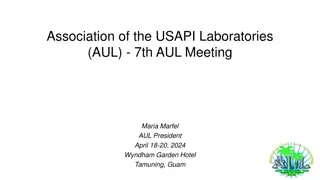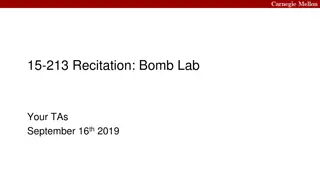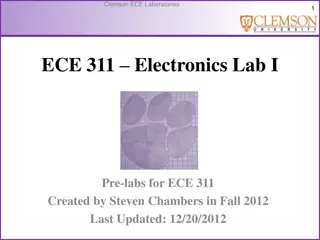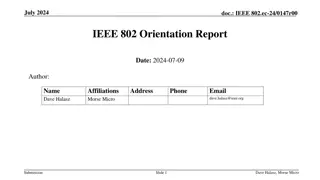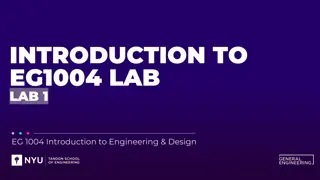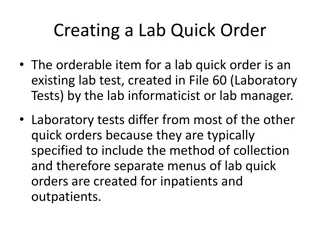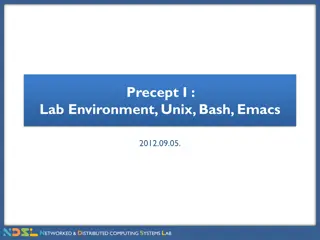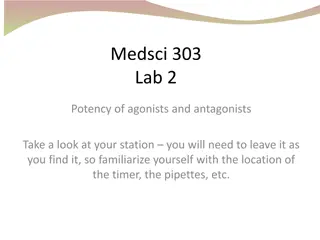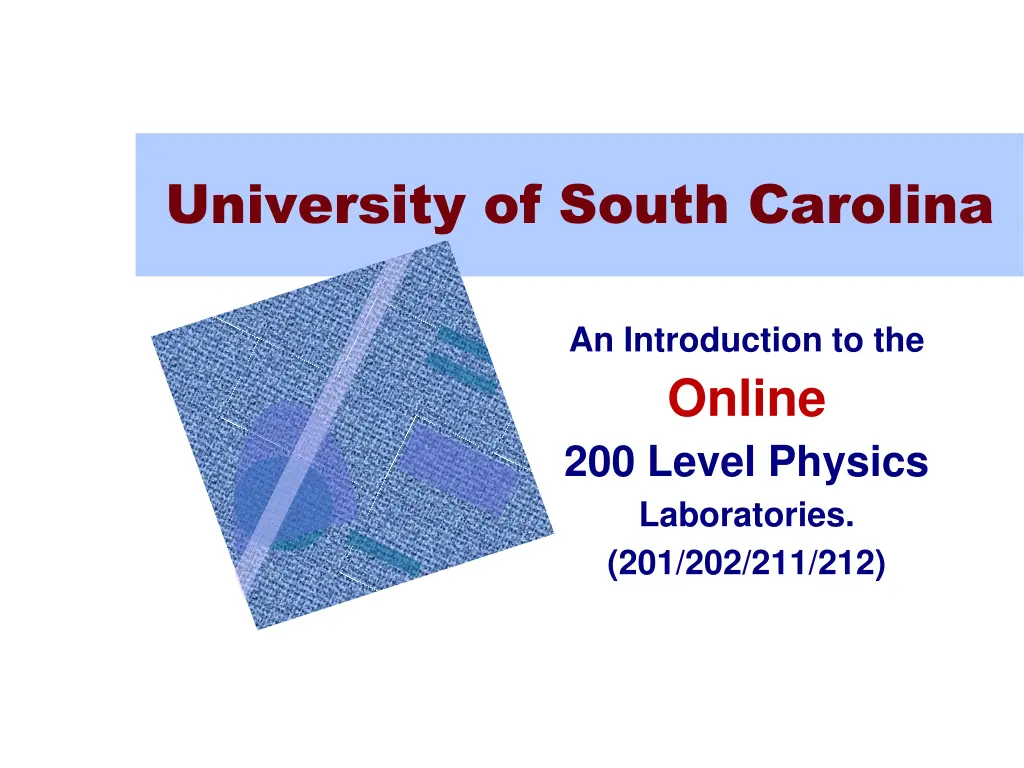
Introduction to University of South Carolina Online Physics Labs
Explore the online 200-level physics laboratories at the University of South Carolina, covering courses like PHYS 201L, 202L, 211L, and 212L. Discover the attendance policy, eligibility requirements, course relation, objectives, and course outline for a comprehensive experience in experimental physics.
Download Presentation

Please find below an Image/Link to download the presentation.
The content on the website is provided AS IS for your information and personal use only. It may not be sold, licensed, or shared on other websites without obtaining consent from the author. If you encounter any issues during the download, it is possible that the publisher has removed the file from their server.
You are allowed to download the files provided on this website for personal or commercial use, subject to the condition that they are used lawfully. All files are the property of their respective owners.
The content on the website is provided AS IS for your information and personal use only. It may not be sold, licensed, or shared on other websites without obtaining consent from the author.
E N D
Presentation Transcript
University of South Carolina An Introduction to the Online 200 Level Physics Laboratories. (201/202/211/212)
Summer Lab Information Information for the summer online labs for PHYS 201L, 202L, 211L and 212L is located at: www.uof.sc/physlabs, click on summer labs link.
Online Attendance Policy Please note that this course is held in a synchronous online manner. Your attendance to the course meetings online, at the designated time, is REQUIRED.
Eligibility To be eligible for enrollment in PHYS 2xxL you must satisfy any of three conditions: A. Be currently enrolled in PHYS 2xx. B. Already have a passing grade in PHYS 2xx. C. Have a written waiver from the Undergraduate Director. You will not receive a passing grade in PHYS 2xxL if you do not meet one of these conditions at the end of the semester. Warning: If your eligibility depends on current enrollment and you drop PHYS 2xx, you must independently drop PHYS 2xxL. same
Relation to your course If you are currently in a 200 level physics course (201/202/211/212), you will find that the course and lab do not sync up. You may do experiments in lab that you have not covered the theory for in your course.
Objectives Laboratory is organized to reflect the activities of scientific research. Preparation: textbook Experimental trial and error Collaboration Presentation We use physics as an example of science. Learn how a science is done, not only the results.
Objectives Develop experimental techniques. Observe and record. Analyze. Use the graph as an analysis tool. Prepare a technical oral presentation.
Course Outline Four multi-day cycles Two projects in progress during each cycle. One recitation day per cycle. One presentation day per cycle. In each cycle students will form groups of two as directed by the instructor. You will: Attend online and work on project A in day 1 of the cycle. Attend online and work on project B in day 2. Attend online recitation as needed on day 3 Attend online and do oral presentations on day 4.
Course Outline In each cycle every student will: View the video of the lab project. Analyze the necessary data (group or individual). Submit a final project report for each project (group or individual). Each student will make exactly one presentation during the semester.
E-mail Faculty, instructors, and staff associated with the labs have e-mail addresses posted on the Web. Students are presumed to have an active e-mail address. Primary contact with your instructor will be through email and Blackboard.
Video Links Project video links are located on our 200 level labs web page on the departmental website. www.uof.sc/physlabs
Recommended Materials The Student Laboratory Notebook, University of South Carolina, Physics 201L, 202L, 211L, 212L, published by Hayden McNeil buy it at the bookstore A plastic ruler with both inch and metric units A protractor Have your project description available in print or digitally. The lecture textbook (optional, but encouraged) This is your primary physics reference
Laboratory Notebook Key piece of equipment for any scientist. It is valuable and irreplaceable: Guard it Carefully. You should record Data and observations about the experiment; Calculations; Draft graphs and diagrams. Draft answers to questions. Notes taken during online instruction, and from videos In short, almost everything goes in the notebook. The exception being the final project report (typewritten).
Project Description Format Links to all project descriptions are available on the Summer 200 level lab web page. Objective: describes the goal of the project Equipment: a list of the equipment used. Data collection procedure. Your instructor will be emailing you a data set for each project, if it is not available on Blackboard.
Project Description Format Calculations, Graphs and Diagrams: a list of required graphs and diagrams and the calculations necessary to produce them 1a, 1b, indicate multiple data sets plotted using a common set of axes. Graphs with differing numbers should appear in separate figures with independent sets of axes. Questions: to be answered in your report
Printing Project Descriptions Find project descriptions via www.uof.sc/physlabs Print or download just the ones you need. No project description is more than ten pages. Don t print or download too early. Descriptions are subject to last minute revision. One day before start of cycle is OK.
Cycle Outline 1st day preparation Obtain the project description for the current project from the webpage and read carefully. Study pertinent sections of textbook. Watch the video of the project. 1st day in online lab: Discuss the project with the instructor and ask any questions about the apparatus, the data, or the lab report.
Cycle Outline 2nd day preparation Obtain the project description for the current project from the webpage and read carefully. Study pertinent sections of textbook. Watch the video of the project. 2nd day in online lab: Discuss the project with the instructor and ask any questions about the apparatus, the data, or the lab report.
Cycle Outline 3rd day preparation Work on the assignment for the two experiments discussed in the previous days. 3rd day in lab This is an opportunity to have further discussions with your instructor concerning the current assignments.
Cycle Outline 4th day preparation Prepare presentation (presenters only). 4th day in lab Deliver oral presentation (presenters only). Receive assignments for following cycle (determines partner and projects).
The Presentation Session Each presentation lasts 10 minutes or less. After presentation for one project the instructor will lead a discussion (if needed). The next presentation will prepare at the instructors request. Repeat.
Project Report Reports should include answers to all questions asked in the project description, a well-drawn graph, and any data analysis asked for in the project description. A table of the data that you used must be included in this report.
Project Report A group may by agreement submit a single project report with names of both partners in the email. Partners will receive identical grades for the report. Partners may independently submit project reports. Partners will receive independent grades. Be respectful of your partner try to capitalize on their strengths, compensate their weaknesses, and stimulate them to do their best work, i.e. collaborate.
Report Submission Policy Work submitted after Reading Day will be considered only under extraordinary circumstances. Work submitted by any means other than by upload to Blackboard will be considered only under extraordinary circumstances.
Presentation Preparation Prepare presentation following guidelines in the how-to. Organize your material. Prepare the required slides PowerPoint suggested Rehearse. Check that your material realistically fits within the allotted time. Presenters must be prepared for questions.
Grading 8 final reports (each out of 42, up to 336 pts.) 1 oral presentation (50 pts.) Online class attendance and participation (up to 14 pts.) Each absence a penalty of -10 pts. plus loss of credit for missed work
Grading Scoring 280-299 Score 360-400 340-359 320-339 300-319 Grade A B+ B C+ C D F 240-279 0-239 Late submissions Tardy receipt of documents will be considered the fault of the student no matter what the reason.
Grading Your instructor will strive to be as fair as possible in his grading, but The grades are in the last analysis subjective. Do try to impress your instructor with your knowledge and your skill he can t credit what he can t see.
Attendance Policy Online Attendance is mandatory Excused absences 1 or 2 has no direct effect on grade. You are nonetheless responsible for work missed. Discuss missed presentations with your instructor. More than two excused absences results in an incomplete (I) for the course.
Attendance Policy Ordinarily an excused absence must be arranged with the instructor in advance: Use e-mail or telephone as necessary to be timely. An excused absence requires an explanation On official stationary (letterhead, prescription pad, etc.) Dated and signed by a person of authority (doctor, minister, judge, lawyer, dean, professor, etc.). A note from a friend or parent is not sufficient.
Attendance Policy In case of demonstrable emergency, where the student shows convincingly that advance notification was infeasible, the course supervisor may excuse the absence. Unexcused absences: Each absence a penalty of -10 pts. plus loss of credit for missed work. 2 in same cycle or more than two total results in a grade of F for the course.
Tardiness Policy Tardy online arrival at class by more than 40 minutes will constitute an unexcused absence. Tardy online arrival by 20 to 40 minutes will be automatically excused on the first occasion. Tardy online arrival by 20 to 40 minutes on the second and subsequent occasions will constitute an unexcused absence. Tardy online arrival by less than 20 minutes will not be formally penalized, but it will not endear you to your lab partner nor to your instructor.
The Road to Success Be present for every online session. Preparation Success. Take advantage of your resources. The lecture text Project descriptions and how-to documents The project videos Your partner and the other groups doing the same project Your instructor Web resources
The Road to Success When you have a question First, ask your partner. Next, check the lecture text and project description. Third, check the project video. If you still do not have an answer, ask the laboratory instructor.
The Road to Success Realize that confusion is to be expected If you are confused, then you have the opportunity to learn something! If you are taking the corresponding lecture course contemporaneously, you will encounter some topics first in lab. It s more fun to learn it in lab. You will be better prepared for the lecture course. You can defer the lab to a later semester.
The Road to Success Much of what you can learn in this course is directly applicable to any line of scientific or technical pursuit. Engineers and pre-meds take note! Your instructors have fun doing science and especially physics. They aim to make a career of it. They would like you to share in that fun.
Closing Thought If we teach only the findings and products of science - no matter how useful and even inspiring they may be - without communicating its critical method, how can the average person possibly distinguish science from pseudoscience? Carl Sagan




